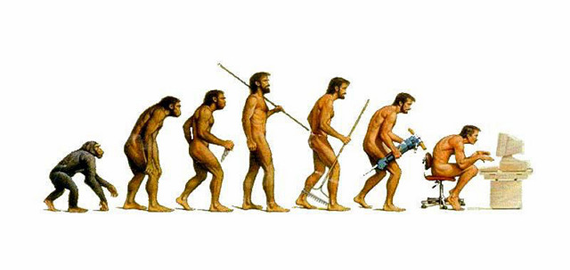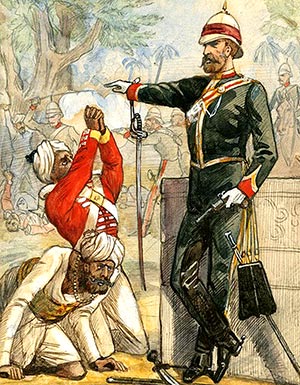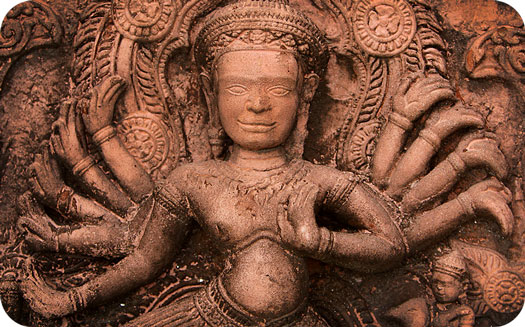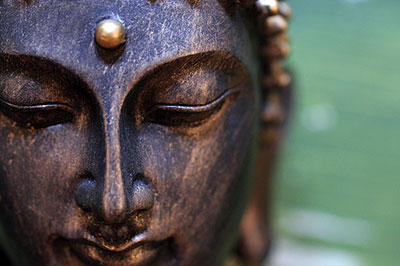
Imagine that you are being held captive in a prison camp and that, with some fellow detainees, you are trying to escape. In order to do this, you manage to dig a tunnel from the floor of a cell into the outside world. But when the big day comes, you find you have simply surfaced in the courtyard outside, so you hide your traces and try again.
This time your tunnel is much longer, but again it is a failure. You have arrived beyond the courtyard but still within the prison grounds and in sight of the machine-gun-toting security guards. Months later, you have succeeded in digging a tunnel that is already much longer than your previous attempts and must surely be about to take you beyond the final boundary and into freedom. But then you have to stop. Your tunnelling has brought you up against a massive concrete wall, sunk deep into the ground precisely in order to stop escape attempts such as yours.
There are many different ways in which one could use this scenario as a political analogy in order to illustrate the limits of certain approaches. One might, for instance, regard a faith in the possibilities of radical change through electoral participation as being a very short tunnel that leaves the would-be escapees firmly within the same prison compound. One might regard the slightly longer tunnel as being akin to an anti-capitalism which fails to take into account the fact that the whole infrastructure of industrial society is inherently capitalist and that in order to escape capitalism we will have to escape industrialism. And one might regard the final tunnel as being an attempt at political thinking that, for all its far-reaching radical intent, remains very much contained within the superficiality of modern industrial-capitalist thought and is therefore incapable of sourcing the metaphysical depth which is necessary to break free from its self-referential limitations.

I would like to take a closer look at the last two of these propositions, starting with my insistence that an authentic anti-capitalism must necessarily be anti-industrialist. “Factories, machines and bureaucracies are the real pillars of capitalist oppression”, Miguel Amorós writes in his essay Elementary Foundations of the Anti-Industrialist Critique. (1) I absolutely agree with him, but his insight is by no means shared by all those who terms themselves enemies of the capitalist system. This is not a recent ideological phenomenon, either. In his illuminating 2015 study, José Ardillo writes that “19th century social thinkers and agitators nearly all positioned themselves within the movement for scientific and technological progress”.(2) He notes with evident frustration how this attitude has continued into the 21st century and even corrupted environmental thinking with its emphasis on “green” technological fixes, such as so-called renewable energy sources, for industrial capitalism’s many problems. “It’s not alternatives to conventional energy sources that we need to find, but a way out of this whole world of energy consumption that they have led us into”, Ardillo rightly insists.(3)
E.F. Schumacher also calls for a wider vision in his classic book Small is Beautiful, when he writes: “Fossil fuels are merely a part of the ‘natural capital’ which we steadfastly insist on treating as expendable, as if it were income, and by no means the most important part. If we squander our fossil fuels, we threaten civilization; but if we squander the capital represented by living nature around us, we threaten life itself”.(4) First published in 1973, Schumacher’s book inspired a whole new wave of thinking that challenged the assumptions behind capitalist economics and spread the alternative idea of décroissance or degrowth based on his observation that “infinite growth in a finite environment is an obvious impossibility”.(5)
Unfortunately, this idea has remained distinct from the main thrust of anarchist and other left-wing thinking. Partly, perhaps, this is because some of those embracing degrowth are naïve in other respects, and are effectively committed to digging the shortest tunnel in our analogy, imagining that somehow the machineries of “democracy” and the state can be used to bring about fundamental change. But there is also fault to be found on the anarchist side. Although generally less dogmatic than Marxists in this respect, many anarchists are still stuck within the broader sphere of industrial-capitalist thought.

They fail to challenge the greatest myth that capitalism has created to justify its own existence – the myth of “progress”, of “development”, of the need for permanent “economic growth”. Ardillo puts some of the blame for this on Murray Bookchin, the late American social ecologist whose brand of municipal anarchism has recently been taken up by the Kurdish rebels of the PKK: “Bookchin believes that technological development must continue; in his view, the liberation of humankind depends on this. According to him, criticism of ‘abundance’, that’s to say the political consideration of a possible self-limitation based on simple methods and human energy, is therefore consigned to the scrapheap of reactionary thinking. It’s to be regretted that Bookchin’s views on energy and industrial abundance have had, and continue to have, such an influence on the opinions of a large part of the anarchist movement”.(6)
Industrialism is capitalism. It is capitalism in the shape of bricks and mortar, of steel and concrete, of tarmac and plutonium. Its sole purpose is to make money, to enrich the few at the expense of the many and of the planet. An inability to understand this – and still worse to imagine that this radical anti-capitalist insight is somehow reactionary – represents a serious impediment to the revolutionary potential of the anti-capitalist movement. It prevents the digging of any ideological tunnel that can lead us out of the nightmare of unending capitalist “development”, of spiralling environmental destruction, of a planetary poisoning which can only end in disaster. Why would any anti-capitalist want their thinking to remain within the philosophical prison built for us by the capitalist system, with all its capitalist assumptions about the purpose of life, individually and collectively? It is only from the specific capitalist point of view, in which its own continuation and expansion is equated with human improvement, that a rejection of the industrial direction appears to be backward-thinking or reactionary. From a point of view outside of that thought-system, the industrial-capitalist belief in infinite “growth” is revealed for what it really is – sheer insanity. Anti-capitalist thinking must position itself defiantly outside the system it opposes, reject all ideological perspectives that are based within that system, find its own ways of describing and evaluating the past, present and future of human society. Herein lies the only possibility of real resistance to the capitalist system as a whole. As Ranchor Prime writes: “Tinkering with the present system is not going to be enough. If there is to be real hope of a sane life on this planet for the coming generations, we will have to find a new way of understanding our place in the world”.(7)

This search for a new way of understanding does not have to start from square one – we would do well to look for guidance from the way humans lived before the industrial era enslaved them. This was very much the approach of Mahatma Gandhi (1869-1948) whose resistance to British imperialism in India went hand in hand with a deep opposition to the industrialism which it brought with it. He wrote in 1909: “Machinery has begun to desolate Europe. Ruination is now knocking at the English gates. Machinery is the chief symbol of modern civilization; it represents a great sin… Railways accentuate the evil nature of man. Bad men fulfil their designs with greater rapidity”.(8) His vision for India, betrayed by his capitalist successors, was a return to the simple village life his land had known for thousands of years. And this, he saw, was the only sustainable long-term way forward for humankind as a whole. Gandhi said in a letter to fellow independence campaigner Jawaharlal Nehru in 1945: “I believe that if India, and through India the world, is to achieve real freedom, then sooner or later we shall have to go and live in the villages – in huts, not in palaces. Millions of people can never live in cities and palaces in comfort and peace”.(9)
Behind Gandhi’s imagining of a village-based future (which, of course, need not reproduce the social mores of any particular village-based past) is what Prime describes as “the Hindu ideal of a simple life of dependance upon nature’s goodness”.(10) Once we leave behind the quantitative mindset of modern capitalism and its crazed obsession with the never-ending multiplication of needs and consumption, we begin to come back into contact with what Schumacher calls “the traditional wisdom of mankind”.(11) In India, as elsewhere, this wisdom understands that nature is not a “resource” to be exploited but a living entity of which we form a part. Sevak Sharan explains: “In our Indian perception, manav means a human being who perfectly respects nature and danav means one who misuses nature. It is not wise to go against nature. History has shown that any culture that is not respectful to nature does not last long: it brings about its own downfall. Vedic culture, on the other hand, has lasted for many thousands of years and is still visible even now. It is called Sanatan Dharma, which means the way of life that lasts forever, is self-perpetuating and regenerating”.(12) This ancient wisdom, this cultural belief in a stable natural harmony outside the linear “development” of industrial “progress”, remains a potent inspiration for opposition to the capitalist system. Indian environmentalist Vandana Shiva describes how she met many people during her years fighting the construction of dams “and I found that they were all inspired by the idea that the river is divine, a sacred mother, and that trying to appropriate her water is like annihilating the very source of your sustenance. In fact I’ve learned that there is not one environmental movement in India that is not informed by the ecological roots of Vedic culture”.(13)

The loud-mouthed and whip-wielding ring-masters of El Circo Capitalista have always poured derision on traditional ways of thinking that get in the way of their ticket sales and profit-margins, denouncing them as being primitive, reactionary, obstructive to the best interests of humanity as defined by their very own philosopher-clowns. Thus, when the imperialist UK state introduced the Charter Act in 1813, “Lord Macaulay argued in Parliament that it would be necessary to introduce English education in India at all levels so as to create an elite that was Indian in body, but English in taste and thought. He believed that Indian literature – the Vedas, Upanishads, Gita, Ramayana and Mahabharata – was primitive and bore no comparison to the value of European literature”.(14) Authentic human cultures, and the non-capitalist life philosophy that they invariably enshrine, have always been regarded as an obstacle by those who would steamroller over everything real and natural in pursuit of their own wealth and power, as I have described elsewhere.(15) It is not for nothing that the spectacle of modern capitalism has pitched its philosophical Big Top in the United States of America. Not only was the cultural identity of the indigenous North American peoples ruthlessly crushed by the genocidal European invaders, but those settlers were themselves cut off from the cultures of their home countries. The rich West African culture of the imported slaves, including the spiritual practice of voodoo, was also systematically attacked by the ruling elite. As Angela Davies notes, the slaveocracy “sought to extinguish the collective cultural memory of black people in order to confine them to an inferior social space”.(16) That process was to be continued by a new black middle class whose attachment to the folly of modern capitalism necessitated a rejection of the wisdom of ancient culture, she explains.

Another attack on a manifestation of this same human wisdom, so unacceptable both to the power-hungry Christian religion and to the modern capitalist world which it helped to create, came with the twisted cruelty of the witch-hunts. It was not just individual women who were targeted, but, as Vivianne Crowley sets out, “the remnants of the Old Religion of Europe, the indigenous Paganism that Christianity had suppressed”.(17) Traditional cultures, old ways of thinking, cannot be tolerated by the capitalist system because they fundamentally contradict the modern world-view it has built up and imposed on contemporary society, in which the only way forward can be the capitalist way.
A measure of capitalism’s success in this respect can be seen in the way that, as we noted above, even those who imagine themselves “anti-capitalist” still accept the fundamental assumptions of capitalism and consider it beyond the pale to question the existence of the industrial world it has manufactured. Too many anti-capitalists and anarchists also accept another, related, assumption of the modern world – that any form of spirituality is utter nonsense. There is a close correlation between anti-industrial philosophy and a spiritual outlook – so close that it is often difficult to draw a clear line between them. Gandhi’s anti-industrialism, for instance, was rooted in his Hindu beliefs. As Prime explains: “Even the planet Earth has a soul, and therefore Hindus treat the earth with love and respect, considering her as their mother who gives them life and without whom they would die”.(18) He adds: “In the Vedic vision of the world, consciousness pervades the universe and all within it. A human being, an elephant, a cow, birds, ants, trees, mountains, rivers and the planet earth itself – all are conscious”.(19)
Satish Kumar tells Prime that whereas Western Civilization considers human life to be sacred, Hindus have gone much further and applied this to all life: “Therefore all life forms, not just human beings, must be revered and respected. This is the reason for being vegetarian, which is ecological in the deepest sense. Animal life should not be taken for our own purposes, nor should it be artificially created, as it is in the West where millions of cattle, pigs and chicken are reared for slaughter in factory farms. There should be a natural pattern of birth and death in the forest, on the land, in the air and sea”.(20) The problem in India, says Prime, is that this spiritual awareness of our belonging to nature has been deliberately destroyed by the industrial capitalism originally introduced by the British Empire. “For nearly two hundred years Indians have been estranged from their own culture by English education. They have been encouraged to think in Western ways and to value the things that the West values. Their own traditional values have been marginalized. In many cases they no longer know what those values were or why they were held because those things are no longer taught”.(21)

Across the world, then, humankind has been deliberately cut off from the cultural and spiritual beliefs that once informed its thinking, because these acted as ideological bulwarks against industrial capitalism. It hardly seems outlandish, therefore, to suggest that opponents of industrial capitalism might do well to revisit those beliefs in search of inspiration. It is certainly the case that a narrowly political level of struggle will not suffice to combat the all-pervasive totality of the capitalist system, which has progressively built up ideological defences which extend further and further into our collective thinking, imposing limits which are now so deeply ingrained and widely accepted that they appear self-evident.(22) We need to go much deeper, much further, in our quest for the roots of meaningful resistance. As Schumacher says: “We are suffering from a metaphysical disease, and the cure must therefore be metaphysical”.(23)
In searching for these ancient anti-capitalist beliefs we should not be restricted by the specific form that these might have taken in the past and the now-obsolete socially-conservative attitudes with which they might have become historically associated, such as mysogeny, homophobia or the caste system. It is, instead, the inner content of these traditions which we must seek and in this context any specific genuine path we take will end up leading us to the same spiritual centre. In Small is Beautiful, Schumacher imagines an alternative economic system based on Buddhism, but he insists: “The choice of Buddhism for this purpose is purely incidental; the teachings of Christianity, Islam or Judaism could have been used just as well as those of any other of the great Eastern traditions”.(24) Schumacher follows the likes of Adolf Bastian, René Guénon and Ananda K. Coomaraswamy in identifying what Joseph Campbell describes as “the fundamental unity of the spiritual history of mankind”.(25) The theory here is that beneath the level of specific cultures and practices (Völkergedanken in Bastian’s terms), there are elementary ideas (Elementargedanken) that are universal to humanity.(26) At the core of this universal thinking is the idea of a natural state of harmony and order, explains Campbell: “The Egyptian term forcthis universal order was Ma’at; in India it is Dharma; and in China, Tao”.(27) There is also emphasis, in Schumacher’s words, on “the hollowness and fundamental unsatisfactoriness of a life devoted primarily to the pursuit of material ends, to the neglect of the spiritual”(28) or “the pretence that everything has a price or, in other words, that money is the highest of all values”.(29) Instead there is the conviction that “Nature is sacred, all life is sacred, the whole earth is sacred” and that natural harmony, Sanatan Dharma, has been disrupted by modernity: “Western industrial life has become desacralized”.(30)

In his exploration of the differences between sacred and desacralised ways of thinking, Mircea Eliade stresses the way that the creation of “sacred” places and “sacred” occasions opens up our experience of life beyond the mundane.(31) Connections are made between different levels of existence and the historical linear time within which we are normally trapped is interrupted by our immersion in a time-outside-of-time, a kind of eternity. A holistic universe is revealed to us by “sacred” thinking, a multi-dimensional reality whose macrocosms and microcosms interact and interrelate on every conceivable level.
This idea of “levels” is something which is particularly unacceptable to modern industrial thinking, not least because such an approach inevitably places its own supreme values – money, material possessions, production, quantity – at the very lowest level of human activity. Writes Schumacher: “While traditional wisdom has always presented the world as a three-dimensional structure, where it was not only meaningful but of essential importance to distinguish always and everywhere between ‘higher’ and ‘lower’ things and Levels of Being, the new thinking strove with determination, not to say fanaticism, to get rid of the vertical dimension. How could one obtain clear and precise ideas about such qualitative notions as ‘higher’ or ‘lower’? Was it not the most urgent task of reason to put into their place quantitative measurements?”(32) The very terms “higher” and “lower” are considered unacceptable in certain left-wing intellectual circles today, as they are seen to in some way reflect a hierarchical social approach and therefore to be elitist. This is, of course, a serious misunderstanding – although any attempt to explain that it is so because the terms do not belong to the socio-political level of reality is doomed to failure since the argument cannot be made without reference to something (ie: a level) that is deemed not to exist by those subscribing to this approach!
The switch into a “higher” way of thinking could be seen as a kind of sudden departure from the one-dimensionality of everyday practical thinking, not dissimilar to the creative mould-breaking “lateral thinking” promoted by Edward de Bono. In some ways we might regard “higher” as indicating “more abstract” and, at the same time, “more significant”, because it is dealing with general principles with a permanent universal application rather than specific instances on a provisional physical plane. The “higher” mode of thought is more distanced from the individual’s daily life, being a sort of zooming-out from the issues that normally concern us. But paradoxically it is also closer to the core of the individual and is thus at the same time a zooming-in. Explaining the quasi-universal use of the terminology, Schumacher explains: “‘Higher’ always means and implies ‘more inner’, ‘more interior’, ‘deeper’, ‘more intimate’; while ‘lower’ means and implies ‘more outer’, ‘more external’, ‘shallower’, ‘less intimate’. This synonymity can be found in many languages, perhaps in all of them”.(33)

The fruits of this “higher” thinking are not the pragmatic considerations of the “lower” thought-processes, but something much more exciting – ideas! Writes Schumacher: “Ideas produce insight and understanding and the world of ideas lies within us. The truth of ideas cannot be seen by the senses but only by that special instrument sometimes referred to as ‘the eye of the heart’ which, in a mysterious way, has the power of recognising truth when confronted with it”.(34) He argues: “Only through the ‘heart’ can contact be made with the higher grades of significance and Levels of Being. For anyone wedded to the materialistic scientism of the modern age it will be impossible to understand what this means… He insists that truth can be discovered only by means of the brain, which is situated in the head and not the heart. All of this means that ‘understanding with one’s heart’ is to him a meaningless collection of words… For him, in other words, higher levels of reality simply do not exist, because his faith excludes the possibility of their existence”.(35)
The concept of the “heart” as a neglected organ-of-thought is related to the notion of an unconscious mind, both individual and collective, whose existence and significance has been stifled throughout the centuries by the life-denying dogmas of both organised religion and modern industrial society. “Christianity can be seen as the triumph of the conscious mind over the realm of Nature,” writes Crowley from her pagan perspective, for instance. “The Gods were no longer to be seen as within Nature, but outside it. Nature was no longer sacred and holy, but the creation of a transcendent father (without the mother). Our conscious minds learned to suppress the unconscious and keep it at bay”.(36) For the alchemist tradition, says Johannes Fabricius, the search for treasures hidden deep inside the Earth is “a symbol for their penetration of the ‘crust’ of consciousness and for their discovery of the treasure hidden beneath it in the darkness of the unconscious”.(37) Martin Lings explains that this same idea is also significant in Islamic thought and that “the Quranic perspective agrees with that of the whole ancient world, both of East and of West, in attributing vision to the heart and in using this word to indicate not only the bodily organ of that name but also what this corporeal centre gives access to, namely the centre of the soul, which itself is the gateway to a higher ‘heart’, namely the Spirit”.(38)

The heart, or the unconscious, is the organ of our human spirituality, whose “higher” taste and perspective allows us to look down with disdain on the plastic-wrapped fast-food meal of appearance, money and possessions served up to us at the uninspiring philosophical banquet of industrial-capitalist thought. This spirituality will never be destroyed. It is a quality that survives deep within us and is reborn with each new generation. However, for those who have to grow up in the deadness of the modern world, whose so-called “religions” are mostly nothing more than controlling constructs of the dominant socio-economic system,(39) it is difficult to find a framework in which to express this inherent spirituality. We search for meaning, search for magical experiences, search for a deeper and more vibrant sense of being. But, thanks to the narrow and spirit-denying orthodoxies of the ideological thought police who patrol the boundaries of permissible opinion, this yearning is kept apart from any political engagement. We are forbidden from making the crucial connection between our thwarted desire to really live and the need to shake off the physical and mental shackles of industrial capitalism. We are warned off listening to our hearts – “the faculty of direct spiritual (or intellectual) vision”(40) – and are thus steered away from unleashing the metaphysical uprising that could set human beings free to be everything they have the potential to be.
This uprising, this “metanoia”(41) or “Great Turning”,(42) will take place on the vibrant “higher” level of being whose existence is denied by the defenders of monochromatic industrial flatness: a level of being on which we are not merely isolated individual units, but vital manifestations of organic collective nature and flashing glints in the eye of the eternal cosmos. This does not mean that it will not also take place on the everyday social level – and the depth of the anarchist vision makes it particularly capable of bridging these levels, I have argued elsewhere(43) – but it cannot succeed if it only unfolds on what is regarded as the “political” plane. We must rediscover our belonging to the living universe of which we will always be part, rediscover the ancient wisdom which told of us of this belonging, understand the ways in which this belonging has been hidden from us by an industrial death-dogma which has even contaminated ideologies which seem to preach resistance. That way, when our metaphysical tunnel reaches the final perimeter wall of the industrial capitalist prison, we will have dug deep enough to pass underneath its confining ideological concrete and finally escape to the glorious freedom of Sanatan Dharma, the natural harmony that is the ultimate aim of genuine anarchism.

(This article was originally published as part of Nature, Essence and Anarchy)
1. Miguel Amorós, Fondements élémentaires de la critique anti-industrielle, in Préliminaires: Une perspective anti-industrielle (Villsavary: Éditions de la Roue, 2015), p. 60.
2. José Ardillo, Les illusions renouvelables (Paris: L’Échappée, 2015), p. 91.
3. Ardillo, p. 229.
4. E.F. Schumacher, Small is Beautiful: A Study of Economics As If People Mattered (London: Abacus, 1974), p. 13.
5. Schumacher, Small is Beautiful, p. 40.
6. Ardillo, pp. 127-28.
7. Ranchor Prime, Vedic Ecology: Practical Wisdom for Surviving the 21st Century (Novato, California: Mandala, 2002), p. 154.
8. Mahatma Gandhi, Hind Swaraj, 1909, cit. Prime, p. 86.
9. Gandhi, letter to Nehru, October 5, 1945, cit. Prime p. 91.
10. Prime, p. 65.
11. Schumacher, Small is Beautiful, p. 250.
12. Prime, p. 36.
13. Prime, pp. 130-31.
14. Prime, p. 101.
15. Paul Cudenec, The Stifled Soul of Humankind (Sussex: Winter Oak, 2014).
16. Angela Y. Davies, Blues Legacies and Black Feminism (New York: Random House, 1998) p. 155.
17. Vivianne Crowley, Wicca: The Old Religion in the New Millennium (London: Thorsons, 1996), p. 30.
18. Prime, p. 43.
19. Prime, p. 47.
20. Prime, p. 96.
21. Prime, pp. 148-49.
22. See Denying reality
23. Schumacher, Small is Beautiful, p. 83.
24. Schumacher, Small is Beautiful, p. 43.
25. Joseph Campbell, The Masks of God: Primitive Mythology (London: Souvenir Press, 2011), p. 5.
26. Campbell, p. 32.
27.Campbell, p. 149.
28. Schumacher, Small is Beautiful, p. 31.
29. Schumacher, Small is Beautiful, p. 38.
30. Prime, p. 103.
31. Mircea Eliade, Le sacré et le profane (Paris: Gallimard, 1987).
32. E.F. Schumacher, A Guide for the Perplexed (London: Jonathan Cape, 1977), p. 20.
33. Schumacher, A Guide for the Perplexed, p. 43.
34. Schumacher, A Guide for the Perplexed, p. 58.
35. Schumacher, A Guide for the Perplexed, pp. 54-55.
36. Crowley, p. 181.
37. Johannes Fabricius, Alchemy: The Medieval Alchemists and their Royal Art (London: Diamond Books, 1994), p. 21.
38. Martin Lings, What is Sufism? (London: George Allen & Unwin, 1975), p. 48.
39. Witness the rise of Christianity as the official religion of the Roman Empire.
40. Lings, p. 51.
41. Schumacher, A Guide for the Perplexed, p. 153.
42. “The term ‘The Great Turning’, popularized by Joanna Macy and David Korten, describes the movement from an industrial-growth society to a life-sustaining one”. Helen Moore, Ecozoa (Hampshire: Permanent Publications, 2015), p. 80.
43. Paul Cudenec, The Anarchist Revelation (Sussex: Winter Oak, 2013).
Leave a Reply